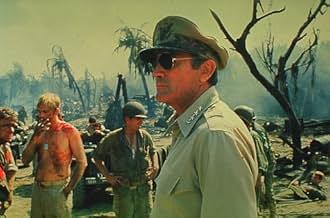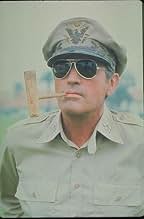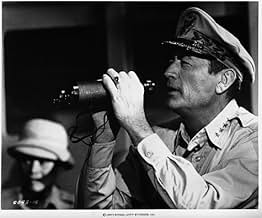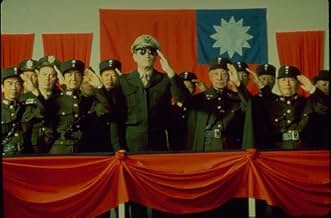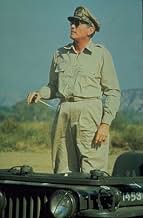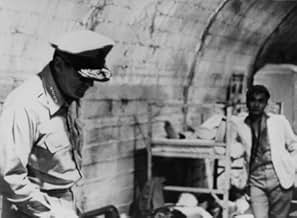IMDb रेटिंग
6.5/10
5.5 हज़ार
आपकी रेटिंग
अपनी भाषा में प्लॉट जोड़ेंBiopic of General Douglas MacArthur covering his war exploits during WW2 and the Korean War.Biopic of General Douglas MacArthur covering his war exploits during WW2 and the Korean War.Biopic of General Douglas MacArthur covering his war exploits during WW2 and the Korean War.
- पुरस्कार
- 2 कुल नामांकन
Russell Johnson
- Admiral King
- (as Russell D. Johnson)
फ़ीचर्ड समीक्षाएं
It is inevitable that MACARTHUR will be compared to PATTON, the other military biopic produced by the late Frank McCarthy. Such comparisons are unfortunate because their subjects are vastly different, albeit controversial figures, and each film takes a different approach in examining their impact on history.
George S. Patton commanded an Army formation in Europe while Douglas Macarthur commanded an entire theater of operation in the Pacific. By his own admission, Patton never had any political ambitions, while MacArthur definitely had such aspirations. Patton's political naivety made him ill-suited as the postwar occupation commander in Bavaria while MacArthur's political astuteness served him well during the occupation of Japan.
Yet both men were great, if iconoclastic military leaders. Patton's brilliant northern pivot during the Battle of the Bulge is matched by the MacArthur's daring amphibious landing at Inchon. And both men believed strongly in their destiny; Patton's belief was based on reincarnation while MacArthur was motivated by following in his illustrious father's footsteps.
Surprisingly, PATTON is the much more succinct, less ambitious film than MACARTHUR. It concentrates on its colorful, mercurial main character during a comparatively brief two-year period between the American defeat at Kasserine Pass in early 1943 to Patton's dismissal prior to his death in late 1945. Although we see Patton's conflict with Omar Bradley, Bernard Montgomery, and Bedell Smith, we never see his interaction with General Dwight Eisenhower, Prime Minister Winston Churchill, or General George Marshall, the U.S. Army's chief of staff.
MACARTHUR is a much more ambitious film, covering nearly a decade from the fall of Bataan in early 1942 to MacArthur's dismissal in 1951. Additionally, MACARTHUR shows a wider range of conflict between MacArthur and such individuals as Admiral Nimitz, General Marshall, ambassador William Averell Harriman, and Presidents Roosevelt and Harry S. Truman.
So, does MACARTHUR match PATTON as a groundbreaking biopic? No, it doesn't.
MACARTHUR lacks the insightful, acerbic screenplay that Francis Ford Coppola and Edmund North supplied PATTON. The direction by TV veteran Joseph Sargent is yeoman-like where the late Franklin J. Schaffner offers a more vigorous, hell-for-leather approach to PATTON. Both films are handsomely mounted productions that serve as a tribute to acumen of the producer McCarthy. Both movies benefit from film scores by the ever-reliable Jerry Goldsmith.
While PATTON has its main character departing in a Valhalla-like denouement, MACARTHUR is book-ended by the legendary speech that the old soldier delivered to the cadet corps at West Point in 1962 as a final valedictory.
At the heart of both films are the extraordinary performances of their lead actors. The late George C. Scott's portrayal of Patton is justly remembered, but Gregory Peck delivers a performance that is both subtle and unapologetic and helps to elevate this often-pedestrian production to a higher level. Peck's portrayal is reminiscent of his work in TWELVE O'CLOCK HIGH, but with the added weight of an additional thirty years of experience and craftsmanship that this great actor brings to bear to this role. Peck is ably supported by Dan O'Herlihy as FDR and the late Ed Flanders as Harry S. Truman.
Finally, I must note the presence of Dr. D. Clayton James, the author of the standard multi-volume biography of MacArthur, who served as this film's technical advisor.
George S. Patton commanded an Army formation in Europe while Douglas Macarthur commanded an entire theater of operation in the Pacific. By his own admission, Patton never had any political ambitions, while MacArthur definitely had such aspirations. Patton's political naivety made him ill-suited as the postwar occupation commander in Bavaria while MacArthur's political astuteness served him well during the occupation of Japan.
Yet both men were great, if iconoclastic military leaders. Patton's brilliant northern pivot during the Battle of the Bulge is matched by the MacArthur's daring amphibious landing at Inchon. And both men believed strongly in their destiny; Patton's belief was based on reincarnation while MacArthur was motivated by following in his illustrious father's footsteps.
Surprisingly, PATTON is the much more succinct, less ambitious film than MACARTHUR. It concentrates on its colorful, mercurial main character during a comparatively brief two-year period between the American defeat at Kasserine Pass in early 1943 to Patton's dismissal prior to his death in late 1945. Although we see Patton's conflict with Omar Bradley, Bernard Montgomery, and Bedell Smith, we never see his interaction with General Dwight Eisenhower, Prime Minister Winston Churchill, or General George Marshall, the U.S. Army's chief of staff.
MACARTHUR is a much more ambitious film, covering nearly a decade from the fall of Bataan in early 1942 to MacArthur's dismissal in 1951. Additionally, MACARTHUR shows a wider range of conflict between MacArthur and such individuals as Admiral Nimitz, General Marshall, ambassador William Averell Harriman, and Presidents Roosevelt and Harry S. Truman.
So, does MACARTHUR match PATTON as a groundbreaking biopic? No, it doesn't.
MACARTHUR lacks the insightful, acerbic screenplay that Francis Ford Coppola and Edmund North supplied PATTON. The direction by TV veteran Joseph Sargent is yeoman-like where the late Franklin J. Schaffner offers a more vigorous, hell-for-leather approach to PATTON. Both films are handsomely mounted productions that serve as a tribute to acumen of the producer McCarthy. Both movies benefit from film scores by the ever-reliable Jerry Goldsmith.
While PATTON has its main character departing in a Valhalla-like denouement, MACARTHUR is book-ended by the legendary speech that the old soldier delivered to the cadet corps at West Point in 1962 as a final valedictory.
At the heart of both films are the extraordinary performances of their lead actors. The late George C. Scott's portrayal of Patton is justly remembered, but Gregory Peck delivers a performance that is both subtle and unapologetic and helps to elevate this often-pedestrian production to a higher level. Peck's portrayal is reminiscent of his work in TWELVE O'CLOCK HIGH, but with the added weight of an additional thirty years of experience and craftsmanship that this great actor brings to bear to this role. Peck is ably supported by Dan O'Herlihy as FDR and the late Ed Flanders as Harry S. Truman.
Finally, I must note the presence of Dr. D. Clayton James, the author of the standard multi-volume biography of MacArthur, who served as this film's technical advisor.
The movie "MacArthur" begins and ends at Gen. Douglas MacArthur's, Gregory Peck, Alma Mata the US Military Academy of West Point on the Hudson. We see a frail 82 year old Gen.MacArthur give the commencement speech to the graduating class of 1962 about what an honor it is to serve their country. The film then goes into an almost two hour long flashback on Gen. MacArthur's brilliant as well as controversial career that starts in the darkest hours of WWII on the besieged island of Corregidor in the Philippines in the early spring of 1942.
Told to leave he island for Australia before the Japanese military invade it Gen. MacArthur for the very first time in his military career almost disobeys a direct order from his superior US President Franklin D. Roosevelt, Dan O'Herlihy. Feeling that he'll be deserting his men at their greatest hour of need MacArthur reluctantly, together with his wife and young son, did what he was told only to have it haunt him for the reminder of the war. It was that reason, his escape under fire from death or captivity by the Japanese, that drove Gen. MacArthur to use all his influence to get FDR two years later to launch a major invasion of the Philippians, instead of the island of Formosa, to back up his promise to both the Philippine people as well as the thousands of US POWS left behind. That he'll return and return with the might of the US Army & Navy to back up his pledge!
In the two years up until the invasion of the Philippine Islands Gen. MacArther battered the Japanese forces in the South Pafific in a number of brilliantly conceived island hop battles that isolated and starved hundreds of thousands of Japanese troops into surrender. The General did that suffering far less US Military losses then any other allied commander in the War in the Pacific!
It was in 1950/51 in the Korean War that Gen. MacArthur achieved his most brilliant victory as well as his worst military defeat. After outflanking the advancing North Korean Army in the brilliant and perfectly executed, with the invading US Marines suffering less then 100 casualties, back door or left hook invasion of Inchon Gen. MacArther feeling invincible sent the US/UN forces under his command to the very border, along the Yalu River, of Communist Red China. Told by his subordinates that he's facing the threat of a massive ground attack by Communist Chinese troops Gen. MacArthur pressed on anyway until that attack did materialized cutting the US & UN forces to ribbons. The unstoppable wave after wave of attacking Red Chinese troops forced the US/UN forces to retreat in the "Big Bug Out" of 1950 with their very lives, leaving all their equipment behind, across the North Korean border even abandoning the South Korean capital city of Seoul! This turned out to be one of the biggest military disaster in US history with the US forces losing a record, in the Korean War, 1,000 lives on the very first day-Nov. 29/30 1950-of the Communist Chinese invasion!
Shocked and humiliated in what he allowed, due mostly to his own arrogance, to happened MacArthur went on the offensive not against the advancing Communist Chinese and Noth Koreans forces but his own Commander and Chief Pres. Harry S. Truman, Ed Flanders, in him not having the spin or guts to do what has to be done: Launch a full scale invasion of Communist China with nuclear weapons if necessary to prevent its troops from overrunning the Korean Peninsula! For Pres. Truman who had taken just about enough garbage from Gen. MacArthur in him running off his mouth in public in how he was mishandling the war in not going all out, like MacArthur wanted him to, against the Red Chinese this was the last straw! On April 11, 1951 Pres. Truman unceremoniously relived Gen. MacArthur from his command as Supreme Commander of the US/UN forces in Korea! Pres. Truman's brave but very unpopular decision also, by not going along with MacArthur's total war strategy, prevented a Third World War from breaking out with the Soviet Union-Communist China's ally- who at the time-like the US-had the Atomic Bomb! Pres. Truman''s controversial decision to dump the very popular Gen. MacArthur also cost him his re-election in 1952 with his polls numbers so low-in the mid 20's- that he withdrew-in March of that year- from the US Presidential Campaign!
In was Gen. MacArthur's misfortune to be around when the political and military climates in the world were changing in how to conduct future wars. With the horrors of a nuclear war now, in 1950/51, a reality it would have been national suicide to go all out, like Gen. MacArthur wanted to, against the Red Chinese with it very possibly touching off a nuclear holocaust that would engulf not only the US USSR & Red China but the entire world! It was that important reality of future war that Gen. MacArthur was never taught, since the A and H Bomb weren't yet invented, in West Point.
Back to 1962 we can now see that Gen. MacArthur, after finishing his commencement speech at West Point, had become both an older and wiser soldier as well as , since his retirement from the US Military, elder statesman in his feeling about war and the utter futility of it. One thing that Gen. MacArthur was taught at an early age, from his Civil War General dad Douglas MacArthur Sr, that stuck to him all his life was that to a soldier like himself war should be the very last-not first-resort in settling issues between nations. In that it's the soldiers who have to fight and die in it. It took a lifetime, with the advent of the nuclear age, for Gen. MacArthur to finally realize just how right and wise his dad a Congressional Medal of Honor winner, like himself, really was!
Told to leave he island for Australia before the Japanese military invade it Gen. MacArthur for the very first time in his military career almost disobeys a direct order from his superior US President Franklin D. Roosevelt, Dan O'Herlihy. Feeling that he'll be deserting his men at their greatest hour of need MacArthur reluctantly, together with his wife and young son, did what he was told only to have it haunt him for the reminder of the war. It was that reason, his escape under fire from death or captivity by the Japanese, that drove Gen. MacArthur to use all his influence to get FDR two years later to launch a major invasion of the Philippians, instead of the island of Formosa, to back up his promise to both the Philippine people as well as the thousands of US POWS left behind. That he'll return and return with the might of the US Army & Navy to back up his pledge!
In the two years up until the invasion of the Philippine Islands Gen. MacArther battered the Japanese forces in the South Pafific in a number of brilliantly conceived island hop battles that isolated and starved hundreds of thousands of Japanese troops into surrender. The General did that suffering far less US Military losses then any other allied commander in the War in the Pacific!
It was in 1950/51 in the Korean War that Gen. MacArthur achieved his most brilliant victory as well as his worst military defeat. After outflanking the advancing North Korean Army in the brilliant and perfectly executed, with the invading US Marines suffering less then 100 casualties, back door or left hook invasion of Inchon Gen. MacArther feeling invincible sent the US/UN forces under his command to the very border, along the Yalu River, of Communist Red China. Told by his subordinates that he's facing the threat of a massive ground attack by Communist Chinese troops Gen. MacArthur pressed on anyway until that attack did materialized cutting the US & UN forces to ribbons. The unstoppable wave after wave of attacking Red Chinese troops forced the US/UN forces to retreat in the "Big Bug Out" of 1950 with their very lives, leaving all their equipment behind, across the North Korean border even abandoning the South Korean capital city of Seoul! This turned out to be one of the biggest military disaster in US history with the US forces losing a record, in the Korean War, 1,000 lives on the very first day-Nov. 29/30 1950-of the Communist Chinese invasion!
Shocked and humiliated in what he allowed, due mostly to his own arrogance, to happened MacArthur went on the offensive not against the advancing Communist Chinese and Noth Koreans forces but his own Commander and Chief Pres. Harry S. Truman, Ed Flanders, in him not having the spin or guts to do what has to be done: Launch a full scale invasion of Communist China with nuclear weapons if necessary to prevent its troops from overrunning the Korean Peninsula! For Pres. Truman who had taken just about enough garbage from Gen. MacArthur in him running off his mouth in public in how he was mishandling the war in not going all out, like MacArthur wanted him to, against the Red Chinese this was the last straw! On April 11, 1951 Pres. Truman unceremoniously relived Gen. MacArthur from his command as Supreme Commander of the US/UN forces in Korea! Pres. Truman's brave but very unpopular decision also, by not going along with MacArthur's total war strategy, prevented a Third World War from breaking out with the Soviet Union-Communist China's ally- who at the time-like the US-had the Atomic Bomb! Pres. Truman''s controversial decision to dump the very popular Gen. MacArthur also cost him his re-election in 1952 with his polls numbers so low-in the mid 20's- that he withdrew-in March of that year- from the US Presidential Campaign!
In was Gen. MacArthur's misfortune to be around when the political and military climates in the world were changing in how to conduct future wars. With the horrors of a nuclear war now, in 1950/51, a reality it would have been national suicide to go all out, like Gen. MacArthur wanted to, against the Red Chinese with it very possibly touching off a nuclear holocaust that would engulf not only the US USSR & Red China but the entire world! It was that important reality of future war that Gen. MacArthur was never taught, since the A and H Bomb weren't yet invented, in West Point.
Back to 1962 we can now see that Gen. MacArthur, after finishing his commencement speech at West Point, had become both an older and wiser soldier as well as , since his retirement from the US Military, elder statesman in his feeling about war and the utter futility of it. One thing that Gen. MacArthur was taught at an early age, from his Civil War General dad Douglas MacArthur Sr, that stuck to him all his life was that to a soldier like himself war should be the very last-not first-resort in settling issues between nations. In that it's the soldiers who have to fight and die in it. It took a lifetime, with the advent of the nuclear age, for Gen. MacArthur to finally realize just how right and wise his dad a Congressional Medal of Honor winner, like himself, really was!
Unlike Patton, Pershing, Grant or Eisenhower, MacArthur is a many sided character and Peck played the part as I believe MacArthur really was. The positive PR version produced by the U.S. Army in the l940's or the negative liberal press version of the l950's are very limited in their understanding of this great man. I have always believed that MacArthur was a turn of the century progressive much like Teddy Roosevelt, at the same time both imperial and caring, who lived past his time into the l960's. His tactical decisions were unmatched by any general in our history. His speeches rival those of William Jennings Bryan or Patrick Henry and I'm sure many wish we could send him and his administrative skills to Iraq to put that mess back together. In the years since his death a small cult has grown up around his memory much like Robert E.Lee and to some his words are almost mystical. He was a major player in one way or another in WWI, the depression, WWII, Korea and if you count his death-bed plea to President Johnson to get our troops out of Vietnam, even the Vietnam War. If you want to stretch things even farther, he can be tied to turn of the century imperialism and the Spanish-American War through his part in the Philippine Insurrection following the Spanish-American War and if you must, the Indian Wars which he experienced as a small boy with his parents. He has been described as a conservative, a liberal, a militant and a pacifist. How could one man be so much a part of the 19th century and believe in war only between individuals(like Custer and Crazy Horse) or as in feudal times yet advocate A-bombing China? He is always described as arrogant and overly dramatic but like Grant he wore a simple 2nd Lieutenant's uniform with five stars on the shoulder minus all the medals that the "G.I. generals" wore. I believe his love for the people of Asia was sincere and in this was he was like Alexander or Caesar. We are fortunate Gregory Peck did play MacArthur as such a complex individual. To focus only on the Five-Star General with the corn-cob pipe is to miss the the big picture. No wonder Patton is so easy to watch compared to MacArthur. I have seen the movie at least 15 times and am still moved by it.
This is a sound and thoughtful performance by Peck, who was saddled by a Ciceronian script, some of it presumably emanating from MacArthur himself.
MacArthur's conviction that war is a great evil is convincingly portrayed, as is the relish of a general doing the only thing for which he was trained: the prosecution of war to the utmost severity.
The real heroes of this movie are the politicians. Not just Roosevelt, but also the caricature of Truman, and the never seen or heard Eisenhower (a good clerk according to Peck's MacArthur). This movie reminded me that it is as important for a politician to compromise as for it is a general to combat.
MacArthur's greatest opportunity was to become military ruler of a defeated Japan, for 3 years. It appears that he seized this to some good effect. He later claimed that:
"The Japanese people since the war have undergone the greatest reformation recorded in modern history. With a commendable will, eagerness to learn, and marked capacity to understand, they have from the ashes left in war's wake erected in Japan an edifice dedicated to the supremacy of individual liberty and personal dignity, and in the ensuing process there has been created a truly representative government committed to the advance of political morality, freedom of economic enterprise, and social justice."
In this one seems to hear the tone of a general boasting about his troops. That is no small thing: for a fighter to impose a peace, on more or less unconditional terms, and seek to reconstitute, rather than to humiliate. He would have made an abominably bad politician, but as interim ruler he ain't done so bad, according to this thoughtful movie.
7/10 for movie making; 8/10 for thought provocation.
David Broadhurst
MacArthur's conviction that war is a great evil is convincingly portrayed, as is the relish of a general doing the only thing for which he was trained: the prosecution of war to the utmost severity.
The real heroes of this movie are the politicians. Not just Roosevelt, but also the caricature of Truman, and the never seen or heard Eisenhower (a good clerk according to Peck's MacArthur). This movie reminded me that it is as important for a politician to compromise as for it is a general to combat.
MacArthur's greatest opportunity was to become military ruler of a defeated Japan, for 3 years. It appears that he seized this to some good effect. He later claimed that:
"The Japanese people since the war have undergone the greatest reformation recorded in modern history. With a commendable will, eagerness to learn, and marked capacity to understand, they have from the ashes left in war's wake erected in Japan an edifice dedicated to the supremacy of individual liberty and personal dignity, and in the ensuing process there has been created a truly representative government committed to the advance of political morality, freedom of economic enterprise, and social justice."
In this one seems to hear the tone of a general boasting about his troops. That is no small thing: for a fighter to impose a peace, on more or less unconditional terms, and seek to reconstitute, rather than to humiliate. He would have made an abominably bad politician, but as interim ruler he ain't done so bad, according to this thoughtful movie.
7/10 for movie making; 8/10 for thought provocation.
David Broadhurst
There isn't much argument that MacArthur was a good strategist and a brave man. And that's the picture you get of him in this movie. Besides a bit of vanity, only the slightest, the general seems to have no flaws. The dark side of this genius is missing.
Of course no movie, not even at 130 minutes, can capture all of a man's professional history, but the lacunae here are convenient ones. The upshot is that this is like one of those John Singer Sargent portraits of society women that made them look sexier and prettier than they probably were.
For instance, MacArthur remarks somewhere along the line that his casualties are fewer than anyone else's (or something like that) when in fact those figures have been contested. MacArthur's aching desire to invade China is turned into a kind of a joke, when he complains that he is only allowed to bomb the southern entrances to bridges across the Yalu River -- "In all my career, I've never learned how to bomb HALF A BRIDGE." Very amusing. But then his political views as a whole, which were somewhere to the right of Attila the Hun's, are skipped over. His run for president fizzled because not even the most rabid anti-communist power broker wanted a war with China, but this too is turned into a morbid joke, when MacArthur remarks to his wife about the newly elected Eisenhower -- "He'll make a great president. He was the best clerk I ever had." (Eisenhower's joke appears elsewhere -- "I spent seven years under MacArthur studying dramatics.") The most illustrative revelation of MacArthur's character isn't in the film. MacArthur recruited Weldon E. Rhoades as the personal pilot of his B-17 and the aviator became a loyal disciple and sometimes personal confidant. By Rhoades' own admission, "this meant that the general would talk for great lengths of time during which Rhoades was not expected to respond."
One last point that is glossed over. MacArthur is stuck on the island of Corregidor in the Philippines surrounded by Japanese but prepared to fight it out. He is ordered to return to Australia on PT boats. He objects strenuously but in the end obeys his orders and retreats. It's a dangerous voyage on small worn-out boats made of plywood. And for this he is awarded the medal of honor. The officers and men of that handful of boats made the same voyage -- round trip too -- and no medals of honor for them, although they were acting under the same conditions, following orders. (An aside: the bar is a little lower for high-ranking officers, which is why their dress uniforms seem to droop with decorations like some Latin American dictators'.)
But it's not a bad movie, as long as you're looking for a heroic picture of an undoubtedly heroic man. Gregory Peck exudes his usual sincerity and is a much more effective speaker than MacArthur himself who almost always sounded like a blowhard. And Peck had to do quite a good job to overcome that florid prose -- "Still, I listen with thirsty ear for the tocsin call," etc. ("Thirsty ear.") In a speech at West Point McArthur also misattribues a quote from Santayana to Plato ("only the dead have seen the end of war"), but that's carping.
The movie follows the same pattern as "Patton." Give us an admirable hero, one human enough to have a little fun poked at him. (Peck emerges from a shower draped in a couple of huge bath towels arranged like a toga, so that he resembles Caesar.) Surround him with devoted but sometimes puzzled subordinates who, when they are not courting his favor, are warning him that something he plans to do might be misinterpreted by the suits back in Washington. Just don't have him do anything seriously wrong.
Production values are good. This is an expensive picture. Supporting players more or less blend into one another -- there's only room for one Caesar in this movie.
Some things are left unexplained, unintentionally it would seem, since this is not the kind of movie that thrives on leaving anything up to the viewer. General Wainwright is left behind on Corregidor to surrender to the Japanese. Back in Australia, MacArthur fumes at such cowardice, Wainwright must be temporarily deranged. But when they meet again when Manila is liberated, MacArthur greets him like a long lost pal. What happened? And the big meeting between MacArthur and Truman that was supposed to iron out the differences between them? It's confusingly staged and scripted. Both sides seem to come away satisfied but, if that were the case, the satisfaction must have been based on some profound misunderstandings because afterward MacArthur and Truman both went merrily on their divergent ways.
I kind of enjoy watching it once in a while. The Irish Daniel O'Herlihy does a side-splitting impression of Franklin D. Roosevelt. And the action scenes are fairly well done. I do wish that the movie had been more honest with its subject. As it is, it's a flawed movie about a flawed but remarkable man.
Of course no movie, not even at 130 minutes, can capture all of a man's professional history, but the lacunae here are convenient ones. The upshot is that this is like one of those John Singer Sargent portraits of society women that made them look sexier and prettier than they probably were.
For instance, MacArthur remarks somewhere along the line that his casualties are fewer than anyone else's (or something like that) when in fact those figures have been contested. MacArthur's aching desire to invade China is turned into a kind of a joke, when he complains that he is only allowed to bomb the southern entrances to bridges across the Yalu River -- "In all my career, I've never learned how to bomb HALF A BRIDGE." Very amusing. But then his political views as a whole, which were somewhere to the right of Attila the Hun's, are skipped over. His run for president fizzled because not even the most rabid anti-communist power broker wanted a war with China, but this too is turned into a morbid joke, when MacArthur remarks to his wife about the newly elected Eisenhower -- "He'll make a great president. He was the best clerk I ever had." (Eisenhower's joke appears elsewhere -- "I spent seven years under MacArthur studying dramatics.") The most illustrative revelation of MacArthur's character isn't in the film. MacArthur recruited Weldon E. Rhoades as the personal pilot of his B-17 and the aviator became a loyal disciple and sometimes personal confidant. By Rhoades' own admission, "this meant that the general would talk for great lengths of time during which Rhoades was not expected to respond."
One last point that is glossed over. MacArthur is stuck on the island of Corregidor in the Philippines surrounded by Japanese but prepared to fight it out. He is ordered to return to Australia on PT boats. He objects strenuously but in the end obeys his orders and retreats. It's a dangerous voyage on small worn-out boats made of plywood. And for this he is awarded the medal of honor. The officers and men of that handful of boats made the same voyage -- round trip too -- and no medals of honor for them, although they were acting under the same conditions, following orders. (An aside: the bar is a little lower for high-ranking officers, which is why their dress uniforms seem to droop with decorations like some Latin American dictators'.)
But it's not a bad movie, as long as you're looking for a heroic picture of an undoubtedly heroic man. Gregory Peck exudes his usual sincerity and is a much more effective speaker than MacArthur himself who almost always sounded like a blowhard. And Peck had to do quite a good job to overcome that florid prose -- "Still, I listen with thirsty ear for the tocsin call," etc. ("Thirsty ear.") In a speech at West Point McArthur also misattribues a quote from Santayana to Plato ("only the dead have seen the end of war"), but that's carping.
The movie follows the same pattern as "Patton." Give us an admirable hero, one human enough to have a little fun poked at him. (Peck emerges from a shower draped in a couple of huge bath towels arranged like a toga, so that he resembles Caesar.) Surround him with devoted but sometimes puzzled subordinates who, when they are not courting his favor, are warning him that something he plans to do might be misinterpreted by the suits back in Washington. Just don't have him do anything seriously wrong.
Production values are good. This is an expensive picture. Supporting players more or less blend into one another -- there's only room for one Caesar in this movie.
Some things are left unexplained, unintentionally it would seem, since this is not the kind of movie that thrives on leaving anything up to the viewer. General Wainwright is left behind on Corregidor to surrender to the Japanese. Back in Australia, MacArthur fumes at such cowardice, Wainwright must be temporarily deranged. But when they meet again when Manila is liberated, MacArthur greets him like a long lost pal. What happened? And the big meeting between MacArthur and Truman that was supposed to iron out the differences between them? It's confusingly staged and scripted. Both sides seem to come away satisfied but, if that were the case, the satisfaction must have been based on some profound misunderstandings because afterward MacArthur and Truman both went merrily on their divergent ways.
I kind of enjoy watching it once in a while. The Irish Daniel O'Herlihy does a side-splitting impression of Franklin D. Roosevelt. And the action scenes are fairly well done. I do wish that the movie had been more honest with its subject. As it is, it's a flawed movie about a flawed but remarkable man.
क्या आपको पता है
- ट्रिवियाAlthough Gregory Peck had reservations about the film's script and production quality, he later called it one of his favorite roles, if not one of his favorite movies.
- गूफ़Shortly after MacArthur's escape from the Philippines in the spring of 1942, he complains that the President and the Chiefs of Staff are not sending him enough troops, supplies, and equipment to carry on his war against the Japanese. He says that priorities are instead being given to commanders in other theaters, including Gen Patton in North Africa. However, Patton's troops did not arrive in Africa until November 1942.
- भाव
President Sergio Osmena: You see, General, my people are going to laugh if I fell in deep water. I cannot swim!
General Douglas MacArthur: That's not so bad, Mr. President. Everyone's about to see that I can't walk on water.
- इसके अलावा अन्य वर्जनThe UK DVD issue omits the sequence where MacArthur meets Emperor Hirohito, but instead, adds to the ending. The film now ends with MacArthur and his wife watch a TV transmission of the presidential inauguration of Eisenhower MacArthur's comment: "He will turn out fine. He was the best clerk that ever served under me"), followed by the end of MacArthur's farewell speech at West Point. The subsequent credits starts to roll slightly earlier than previously.
टॉप पसंद
रेटिंग देने के लिए साइन-इन करें और वैयक्तिकृत सुझावों के लिए वॉचलिस्ट करें
- How long is MacArthur?Alexa द्वारा संचालित
विवरण
- रिलीज़ की तारीख़
- कंट्री ऑफ़ ओरिजिन
- भाषा
- इस रूप में भी जाना जाता है
- MacArthur - Held des Pazifik
- फ़िल्माने की जगहें
- Navy Yard, Bremerton, वॉशिंगटन, संयुक्त राज्य अमेरिका(scenes on USS Missouri)
- उत्पादन कंपनी
- IMDbPro पर और कंपनी क्रेडिट देखें
बॉक्स ऑफ़िस
- बजट
- $90,00,000(अनुमानित)
- चलने की अवधि2 घंटे 10 मिनट
- ध्वनि मिश्रण
- पक्ष अनुपात
- 1.85 : 1
इस पेज में योगदान दें
किसी बदलाव का सुझाव दें या अनुपलब्ध कॉन्टेंट जोड़ें


